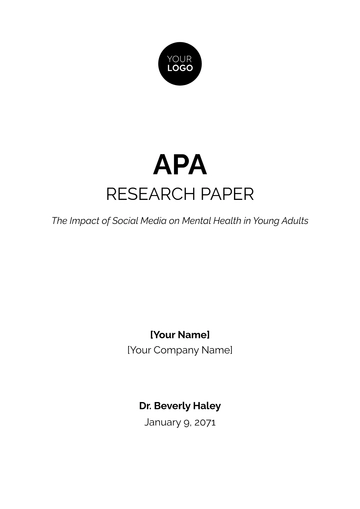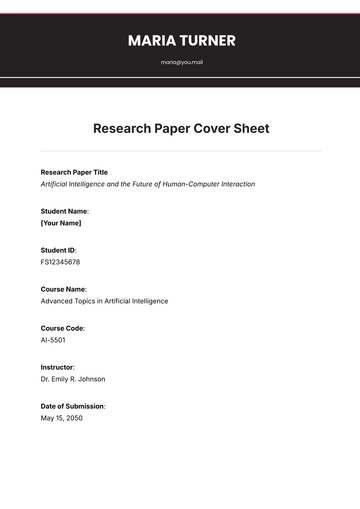Free Scientific Research Paper

[YOUR COMPANY NAME] | [YOUR COMPANY ADDRESS]
I. Abstract
This research investigates the integration of artificial intelligence (AI) in modern healthcare systems, highlighting its transformative potential in diagnostics, treatment planning, patient care, and administrative processes. The study explores various AI technologies, their applications, benefits, and challenges, supported by real-world examples and empirical data.
II. Introduction
Artificial Intelligence (AI) has emerged as a disruptive technology with the capacity to significantly enhance healthcare systems. By leveraging large datasets and sophisticated algorithms, AI can analyze and interpret complex medical data, leading to more accurate diagnoses, personalized treatments, and improved patient outcomes. This paper aims to provide an in-depth analysis of the ways AI is currently being integrated into healthcare and the potential it holds for future advancements.
III. AI Technologies in Healthcare
The application of AI in healthcare is facilitated by various technologies, each serving distinct functions:
Machine Learning (ML): Utilizes statistical techniques to enable machines to improve at tasks with experience, crucial for predictive analytics and diagnostics.
Natural Language Processing (NLP): Allows machines to understand and respond to human language, beneficial in patient communication and administrative tasks.
Robotics: AI-powered robots assist in surgeries, rehabilitation, and elderly care by performing precise and consistent actions.
Deep Learning: A subset of ML that employs neural networks with multiple layers, instrumental in image and speech recognition.
Expert Systems: AI systems designed to mimic the decision-making abilities of a human expert, useful in diagnostics and treatment recommendations.
IV. Applications of AI in Healthcare
AI is revolutionizing healthcare through several key applications:
A. Diagnostics
AI algorithms analyze medical images (such as MRI and CT scans) to detect abnormalities with high accuracy, often surpassing human experts. For instance:
Radiology: AI models identify tumors, fractures, and other conditions in X-rays and MRIs.
Pathology: AI assists in the detection of cancerous cells in biopsy samples.
B. Treatment Planning
AI helps in formulating individualized treatment plans based on patient data, genetic information, and best practices. Notable examples include:
Personalized Medicine: AI predicts patient responses to treatments, enabling customized therapeutic approaches.
Drug Development: AI accelerates the discovery of new drugs by analyzing biological data and predicting molecular behaviors.
C. Patient Care
AI enhances patient care by providing continuous monitoring and support:
Wearable Devices: Track vital signs and predict potential health issues in real time.
Virtual Nursing Assistants: Offer 24/7 patient support, medication reminders, and answer health-related queries.
D. Administrative Efficiency
AI streamlines administrative processes, reducing costs and improving efficiency:
Automated Scheduling: AI algorithms optimize appointment scheduling, minimizing wait times and resource allocation.
Medical Data Management: AI systems manage patient records, ensuring data accuracy and accessibility.
V. Challenges and Ethical Considerations
Despite its advantages, AI in healthcare poses certain challenges and ethical dilemmas:
Data Privacy: Ensuring patient data confidentiality against breaches and misuse.
Bias and Fairness: Addressing biases in AI algorithms to prevent disparity in healthcare delivery.
Regulatory Compliance: Adhering to healthcare regulations and standards for AI technologies.
Integration with Existing Systems: Overcoming technical challenges associated with integrating AI into legacy healthcare systems.
VI. Conclusion
AI holds immense potential to revolutionize healthcare by improving diagnostics, treatment planning, patient care, and administrative efficiency. However, addressing the associated challenges and ethical issues is crucial for its successful implementation. Future research should focus on developing robust AI systems that are transparent, fair, and compliant with regulatory standards, ultimately leading to enhanced healthcare outcomes globally.
VII. References
Topol, E. J. (2059). Deep Medicine: How Artificial Intelligence Can Make Healthcare Human Again. Basic Books.
Jiang, F., Jiang, Y., Zhi, H., Dong, Y., Li, H., Ma, S., & Wang, Y. (2057). Artificial intelligence in healthcare: past, present and future. Stroke and Vascular Neurology, 2(4), 230-243.
Obermeyer, Z., & Emanuel, E. J. (2056). Predicting the future—big data, machine learning, and clinical medicine. The New England Journal of Medicine, 375(13), 1216-1219.
Reddy, S., Fox, J., & Purohit, M. P. (2059). Artificial intelligence-enabled healthcare delivery. Journal of the Royal Society of Medicine, 112(1), 22-28.
- 100% Customizable, free editor
- Access 1 Million+ Templates, photo’s & graphics
- Download or share as a template
- Click and replace photos, graphics, text, backgrounds
- Resize, crop, AI write & more
- Access advanced editor
Enhance your scientific writing with Template.net’s Scientific Research Paper Template. This customizable template, editable in our AI Editor Tool, provides a structured format for presenting your research findings, including sections for methodology, results, and discussion. Perfect for scientists and researchers, this tool ensures your papers are professionally formatted and comprehensive.





























